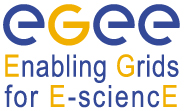Speaker
Mr
Evangelos Floros
(GRNET)
Description
In the last few years, grid usage by EGEE user communities has shifted from testing and experimentation to daily production. At the same time, the number of applications and disciplines exploiting the EGEE infrastructure has grown significantly. The diversification of the user community has brought more demand for the use of commercial software on the grid; partnerships with industry have explored how to make this software available on the EGEE grid infrastructure. The results of these partnerships have expanded the possibilities for exploiting the grid and further increased the number of target communities that can productively use the grid.
In the medium and long-term future, scientific communities face challenges from the rapid political and technical changes associated with grid technology. On the political side, the European grid infrastructure is changing from a project-based model to one based on National Grid Initiatives (NGIs). Keeping a close touch with these developments is important to guarantee an uninterrupted transition. On the technical side, cloud computing, software as a service, hardware as a service and other novel technologies are emerging. Coupled with existing technologies these bring new capacities but also new challenges for efficient communication and sharing within the scientific communities for which the grid has become an important research tool.
This presentation will highlight several success stories from the EGEE user communities. It will also provide the status of application-level initiatives in the project. The talk with finish with a look forward, describing how scientific communities are preparing for the post-EGEE epoch and how new technologies might influence their daily research routine.
